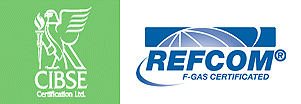R22 Refrigerant replacement service now available.
Buildings account for almost half of the energy consumption and carbon emissions in the UK.
The Air conditioning used in your building can amount to a third of your annual electricity cost. Older, oversized or poorly maintained air conditioning systems may be using more energy and costing more to operate than necessary.
Most businesses have rising energy costs. If you use energy efficiently in your business, you can save money, save energy, stay competitive and reduce carbon emissions from your building. The main things that affect the energy efficiency of your air conditioning system are:
Air conditioning inspections have been introduced by the Government as part of the Implementation of the Energy Performance of Buildings Directive in England and Wales, to give building owners and operators essential information about the energy performance of their air conditioning systems.
The information and advice will highlight possible improvements to:
Mandatory inspections are being introduced for all air conditioning systems with rated cooling output greater than 12kW. This includes the combined output of one or more individual air conditioning units in a building.
If your air conditioning system has a rated output greater than 250 kW, you must have had your first inspection by 4th January 2009. If your air conditioning system has a rated output greater than 12kW, but less than 250kW you must have had your first inspection by 4th January 2011. Thereafter, inspections will be required every 5 years. This is now law.
For new systems installed on or after 1 January 2008, the first inspection must have taken place within 5 years of the installation date.
An energy inspection of your air conditioning system involves a visual assessment of your air conditioning installation. Our inspector will examine the equipment and air movement systems and controls. Additionally, access to plant rooms or rooftop locations will be required. Following the inspection, our inspector will provide you with a report containing:
The current efficiency of your equipment and suggestions for improvement including, where appropriate, its replacement.
A list of any faults identified (e.g. condition of air filters) during the inspection and suggested actions.
The adequacy of the equipment maintenance and suggestions for improvement.
The adequacy of the installed controls and control settings and suggestions for improvement.
The current size of the installed system in relation to the cooling load.
Suggestions for improving the system’s energy efficiency, or, where appropriate minimising or avoiding the need for air conditioning.
You are under no obligation to act on the advice provided in the inspection report.
However, if you do so, it is likely you will reduce energy consumption and costs.
